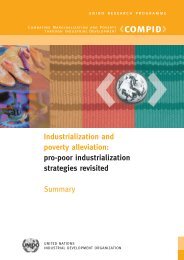Manual on the Development of Cleaner Production Policies ... - Unido
Manual on the Development of Cleaner Production Policies ... - Unido
Manual on the Development of Cleaner Production Policies ... - Unido
Create successful ePaper yourself
Turn your PDF publications into a flip-book with our unique Google optimized e-Paper software.
DEVELOPMENT OF CP POLICY<br />
MODULE 3: CP POLICY DEVELOPMENT CYCLE<br />
SLIDE: Comm<strong>on</strong> barriers to CP policy development/2<br />
• Little integrati<strong>on</strong> <strong>of</strong> CP with o<strong>the</strong>r relevant policies;<br />
• “Not-in-my-term-<strong>of</strong>-<strong>of</strong>fice” syndrome;<br />
• Limited in-country capacity and resources for CP policy development;<br />
• Technical focus <strong>of</strong> most <strong>Cleaner</strong> Producti<strong>on</strong> Centres;<br />
• Difficulty in defining what CP is and what it is not, and in measuring <strong>the</strong><br />
results <strong>of</strong> CP.<br />
<br />
With <strong>the</strong>se two sides, show <strong>the</strong> factors likely to hamper policy development.<br />
They are not <strong>the</strong> same as <strong>the</strong> barriers to CP implementati<strong>on</strong> in companies. You<br />
may want to compare <strong>the</strong>se barriers with <strong>the</strong> c<strong>on</strong>diti<strong>on</strong>s necessary for CP<br />
policy development, discussed at <strong>the</strong> beginning <strong>of</strong> module 3.<br />
Background<br />
<strong>Cleaner</strong> Producti<strong>on</strong> <strong>of</strong>ten fails to be implemented as a result <strong>of</strong> human factors ra<strong>the</strong>r than technical<br />
problems. The traditi<strong>on</strong>al end-<strong>of</strong>-pipe approach is well known and accepted by industry and <strong>the</strong><br />
engineering sector. Existing government policies and regulati<strong>on</strong>s <strong>of</strong>ten favour end-<strong>of</strong>-pipe soluti<strong>on</strong>s,<br />
which are easier to administer. However, <strong>the</strong> barriers to CP policy development are somewhat<br />
different than <strong>the</strong> obstacles faced when trying to implement CP in industry.<br />
1. Low envir<strong>on</strong>mental awareness and regulatory pressure<br />
Governments tend to focus <strong>on</strong> ec<strong>on</strong>omic and social issues, and in practical terms <strong>the</strong>ir<br />
commitment to envir<strong>on</strong>mental matters may be limited. Moreover, <strong>the</strong> regulatory framework is<br />
<strong>of</strong>ten insufficient and enforcement weak. This can lead to a culture <strong>of</strong> n<strong>on</strong>-compliance in<br />
industry, especially if much <strong>of</strong> industry is state-owned;<br />
2. Lack <strong>of</strong> public pressure <strong>on</strong> industry and government<br />
Even though <strong>the</strong>re is a recent increase in envir<strong>on</strong>mental awareness, <strong>the</strong>re are few practical<br />
mechanisms that enable <strong>the</strong> public to put pressure <strong>on</strong> industrial enterprises to improve <strong>the</strong>ir<br />
envir<strong>on</strong>mental performance. C<strong>on</strong>sumer demand for “greener” goods is also limited. Lastly, <strong>the</strong>re<br />
is <strong>of</strong>ten a lack <strong>of</strong> political will in <strong>the</strong> Government or <strong>the</strong> parliament to get involved in <strong>the</strong> process,<br />
or even negative lobbying <strong>on</strong> <strong>the</strong> part <strong>of</strong> industrial interest groups;<br />
3. The relati<strong>on</strong>ship between <strong>the</strong> main stakeholders<br />
The Government, <strong>the</strong> business sector and civil society may still be at an early stage, <strong>of</strong>ten<br />
characterized by a lack <strong>of</strong> dialogue or c<strong>on</strong>sultati<strong>on</strong> when preparing policies, and c<strong>on</strong>fr<strong>on</strong>tati<strong>on</strong>al<br />
approaches when faced with a c<strong>on</strong>troversial issue. Similarly, <strong>the</strong>re may be a lack <strong>of</strong> coordinati<strong>on</strong><br />
between government departments. There are generally several government agencies with a direct<br />
stake in CP implementati<strong>on</strong>, but <strong>the</strong>ir activities may not be internally coordinated and it is not<br />
uncomm<strong>on</strong> for various ministries to pursue <strong>the</strong>ir own projects separately. Those developing CP<br />
policy may have to c<strong>on</strong>tend with inter-instituti<strong>on</strong>al tensi<strong>on</strong>s and <strong>the</strong> adversarial attitudes <strong>of</strong><br />
different players;<br />
PAGE 80
















